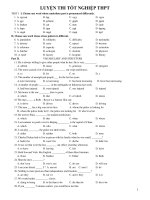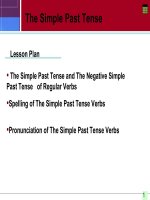The Simple Past Tense
Bạn đang xem bản rút gọn của tài liệu. Xem và tải ngay bản đầy đủ của tài liệu tại đây (323.13 KB, 17 trang )
<span class='text_page_counter'>(1)</span>The simple past tense.
<span class='text_page_counter'>(2)</span> I. How do we form the simple past tense?. English has two types of verbs in the past: -regular -irregular.
<span class='text_page_counter'>(3)</span> Let’s read the following list of past tense verbs….. Which are regular and which are irregular? walked studied taught gave became cried lived did. regular regular irregular irregular irregular regular regular irregular.
<span class='text_page_counter'>(4)</span> II. How to add “ED” after regular V 1. EX: study – studied Cry – Cried Play – Played Enjoy – Enjoyed. Verb ends “Y”: Consonant + Y Vowel + “Y”. change “Y” I + ed keep “Y” + ed.
<span class='text_page_counter'>(5)</span> II. How to add “ED” after regular V 2. Ex:. Bake – baked Like – liked Verb ends in “E” + D 3. Ban – banned Stop – Stopped One syllable verbs end in Vowel + Consonant -> double consonant + ed.
<span class='text_page_counter'>(6)</span> II. How to add “ED” after regular V 4. Admit – admitted. prefer – preferred Two syllable verbs and stress in the second end in Vowel + Consonant double consonant + ed. 5. Others: + ed.
<span class='text_page_counter'>(7)</span> III. Usage The simple past tense: is used to express: 1. action finished in the past (time) EX:. I visited Berlin last week. Andrew watched TV yesterday..
<span class='text_page_counter'>(8)</span> III. usage 2. Series of completed actions in. the past. First I got up, then I brushed my teeth and had breakfast this morning..
<span class='text_page_counter'>(9)</span> III. Usage. 3. A habit in the past Ex: I used to wake up late when I was at high school..
<span class='text_page_counter'>(10)</span> IV. FORM A. TOBE: WAS/WERE WAS: I, SHE, HE, IT, … WERE: THEY, YOU, WE,…. (+) My father was in Nhatrang last month. (-) Last night my parents weren’t on duty. (?) Was she at home last night? Where were you yesterday?.
<span class='text_page_counter'>(11)</span> IV. FORM B. ORDINARY VERD: a. Positive: Ex: a1. Lan bought a new computer last week. irregular V(2nd) a2. He worked hard last week. Regular V. S+V. (2rd) + O - ED.
<span class='text_page_counter'>(12)</span> IV. FORM a. When I (be)……a child, I (play)… piano very well... b. Last week, I (send)…….you a letter..
<span class='text_page_counter'>(13)</span> IV. FORM b. Negative:. Ex: Last week, I didn’t send you a letter.. When I was a child, I didn’t play piano very well S + did’nt + V(bare_inf) + O. Yesterday, Hung (not go)…… to work because he (be)…sick..
<span class='text_page_counter'>(14)</span> IV. FORM c. Question: -Y/N _question: EX: Did you watch TV last night? Did + S + V(bare_inf) + O?.
<span class='text_page_counter'>(15)</span> IV. FORM Wh_question? EX: Where did you go on holiday last summer?. Why didn’t you come last night?. Wh_q + did/didn’t + S + V_(bare _inf) + O?.
<span class='text_page_counter'>(16)</span> V. Pronunciation “ed” 1. /-id/: t, d EX: wanted, decided, ….. 2. /-t/: p, k, f, s, x, sh, ch Ex: stopped, washed, looked, … 3. /-d/: Others EX: lived, loved, stayed,….
<span class='text_page_counter'>(17)</span> VI. Markers Yesterday, ago, In + year, Last night / month / week/year,… The other day (1 ngày nọ) Once upon a time (ngày xửa ngày xưa),….
<span class='text_page_counter'>(18)</span>









